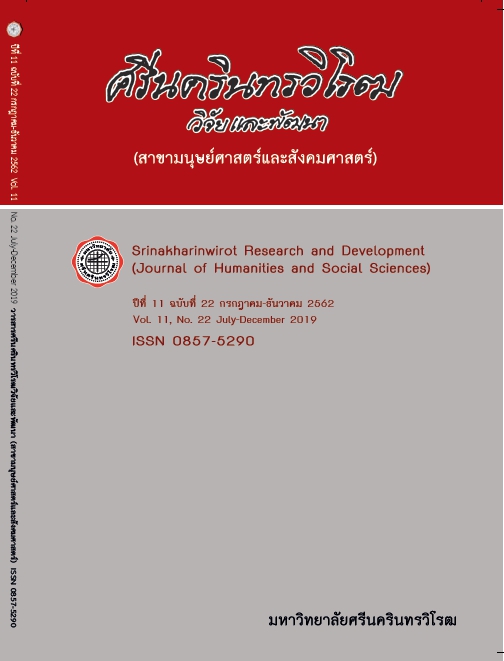ปัจจัยที่มีผลต่อคุณภาพการบริการสาธารณะด้วยเทคโนโลยีดิจิทัลของสถาบันอุดมศึกษาจากมุมมองนโยบายสาธารณะและการจัดการเชิงกลยุทธ์ ()FACTORS AFFECTING QUALITIES OF PUBLIC SERVICES WITH DIGITAL TECHNOLOGIES OF HIGHER EDUCATION INSTITUTIONS FROM PUBLIC POLICY AND S
Keywords:
Qualities of Public Service, Digital Technologies, Higher Education Institutions, Public Policy, Strategic ManagementAbstract
The study was aimed to 1) study qualities of public services with digital technologies of higher education institutions, 2) suggest the model of relationships among the factors affecting qualities of public services with digital technologies of higher education institutions 3) test the model of relationships among the factors affecting qualities of public services with digital technologies of higher education institutions, and 4) analyze the conditions supporting the factors affecting qualities of public services with digital technologies of higher education institutions. This was a quantitative and qualitative research. Data were collected from 113 higher education institutions and in-depth interview with 5 administrators of higher education institutions and Office of the Higher Education Commission. Data were analyzed using descriptive statistics, inferential statistics and content analysis.
Research findings were as follows:1) qualities of public services with digital technologies of higher institutions were at moderate level, 2) the proposed determinants affecting the qualities of public services with digital technologies of higher education institutions comprised the followings: clarity and continuity of policy, participation and mindset of policy actors, financial resource, digital technology infrastructure, coordination network, digital technology and digital technology management knowledge and skill, intellectual property, leadership and motivation, relationships among the organizations with external environments and digital technology readiness of target groups 3) it was found from the determinants test that the readiness of targets on digital technology, relationships among the organizations with external environments and coordination network had direct positive effect on qualities of public services with digital technologies of higher education institutions, while leadership and motivation, digital technology infrastructure, clarity and continuity of policy, digital technology and digital technology management knowledge and skill, financial resource, participation and mindset of policy actors, and intellectual property had indirect effect on qualities of public services with digital technologies of higher education institutions. 4) conditions which supported the factors affecting qualities of public services with digital technologies of higher education institutions were skillfulness, demand, vision of administrators, tenure and transition of administrators, policy alignment, diversity of officers, type and size of higher education institutions, leadership, mindset of policy actors, technology cost,resource limitation, motivation,financial resource, intellectual property ownership, limitation of copyright and intellectual property violation, change resistance, and age of target groups.
Downloads
References
[2] Van M., Donald S., and Van H., Carl E. (1975). The Policy Implementation Process: A Conceptual Framework. Administration and Society. 6(4), 447-448.
[3] Mazmanian, D.A., & Sabatier, P. A. (1982). The Implementation of Public Policy: a Framework of Analysis. Policy Studies Journal. 8(4), 538-567.
[4] ศุภชัย ยาวะประภาษ. (2548). นโยบายสาธารณะ. พิมพ์ครั้งที่ 6. กรุงเทพฯ: จุฬาลงกรณ์มหาวิทยาลัย.
[5] Bhubate S. (2000). Social Network as a Strategic Resource of Thai Exporting SMEs. Doctoral dissertation, The Joint Doctoral Program in Business Administration, Faculty of Commerce and Accountancy, Chulalongkorn University.
[6] วรเดช จันทรศร. (2551). ทฤษฎีการนำนโยบายสาธารณะไปปฏิบัติ. พิมพ์ครั้งที่ 3. กรุงเทพฯ: พริกหวานกราฟฟิค. หน้า 129-146.
[7] Kaplan, R. S., & Norton, D. P. (2001). The Strategy-Focused Organization: How Balanced Scorecard Companies Thrive in the New Business Environment. Boston, Mass: Harvard Business School Press.
[8] Hogwood, B.W., & Gunn, L.A. (1984). Policy Analysis for the Real World. New York: Oxford University. p. 198.
[9] Porter, M. E. (1980). Competitive Strategy: Techniques for Analyzing Industries and Competitors. New York: The Free Press.
[10] Wright, et al. (1992). Strategy Management. Boston: Allyn and Bacon.
[11] เฉลิมพงศ์ มีสมนัย. (2556). การวางแผนกลยุทธ์. ใน เอกสารการสอนชุดวิชา การจัดการเชิงกลยุทธ์ในภาครัฐกิจ (หน่วยที่ 3). นนทบุรี: สำนักพิมพ์มหาวิทยาลัยสุโขทัยธรรมาธิราช. หน้า 3-6.
[12] ชัยสิทธิ์ เฉลิมมีประเสริฐ. (2546). ความพร้อมของหน่วยงานภาครัฐในการบริหารจัดการระบบงบประมาณแบบมุ่งเน้นผลงานตามยุทธศาสตร์ชาติ (Strategic Performance Based Budgeting : SPBB). และกรณีตัวอย่างกรมควบคุมโรค กระทรวงสาธารณสุข. กรุงเทพฯ: ธนธัชการพิมพ์.
[13] ลักษณา ศิริวรรณ. (2561). คุณภาพการบริการสาธารณะด้วยเทคโนโลยีดิจิทัลและปัจจัยที่มีผลต่อคุณภาพการบริการสาธารณะด้วยเทคโนโลยีดิจิทัลของสถาบันอุดมศึกษาจากมุมมองนโยบายสาธารณะและการจัดการเชิงกลยุทธ์. นนทบุรี: มหาวิทยาลัยสุโขทัยธรรมาธิราช.
[14] Rapp, A. (2008). An Empirical Analysis of E-Service Implementation: Antecedents and the Implementation: Antecedents and the Resulting Value Creation. Journal of Services Marketing. 22(1), 24-36.
[15] สำนักงานรัฐบาลอิเล็กทรอนิกส์. (2559). แผนพัฒนารัฐบาลดิจิทัลของประเทศไทย ระยะ 3 ปี (พ.ศ. 2559-2561). กรุงเทพฯ: ส่วนนโยบายรัฐบาลอิเล็กทรอนิกส์ ฝ่ายนโยบายและยุทธศาสตร์ สำนักงานรัฐบาลอิเล็กทรอนิกส์ (องค์การมหาชน). หน้า 171.
[16] Tippawan L. (2006). E-Government in Thailand: Development of Illusion?. Lesson Learned from E-Government in Thailand. In Seminar on Modernising the Civil Service in Alignment with National Development Goals, held by Eastern Regional Organization for Public Administration (EROPA), Brunei Darussalam. November, 13-17: pp. 1-24.
[17] Hazlett, Shirley-Ann. (2003). E-Government: the Realities of Using IT to Transform the Public Sector. Managing Service Quality. 13(6), 445-452.
[18] วลัยวัชร รอดชมภู, และพัชรา อิงคนินันท์. (2559). การวิเคราะห์เชิงลึกสถานภาพการออกแบบและพัฒนาการเรียนการสอน e-learning ของมหาวิทยาลัยสุโขทัยธรรมาธิราช. ม.ป.พ.
[19] สำนักงานคณะกรรมการพัฒนาเศรษฐกิจและสังคมแห่งชาติ. (2560, กรกฎาคม). ภาครัฐดิจิทัลเพื่ออนาคตประเทศไทย. ใน เอกสารประกอบการประชุมประจำปี 2560 ของสำนักงานคณะกรรมการพัฒนาเศรษฐกิจและสังคมแห่งชาติ เรื่อง ขับเคลื่อนแผนฯ 12 สู่อนาคตประเทศไทย. หน้า 3. เมืองทองธานี นนทบุรี.
[20] Goggin, M. L., & O’Toole, L. (1987). Public Policy Implementation: Evolution of the Field and Agenda for Future Research. Policy Studies Review. 7(1), 200-216.
[21] Gen, J. E. (1992, September). Between Autonomy and Capture: Embedding Government Agencies in Their Societal Environment. Policy Studies Journal. 20, 342-364.
[22] Stone, M. M., Bigelow, B., & Crittenden, W. (1999). Research on strategic management in nonprofit organizations: Synthesis, analysis, and future directions. Administration & Society. 31(3), 378-423.
[23] Fu, Hsin-Pin; Chang, Tien-Hsiang; Chao, Pei, & Chiou, Chyou-Huey. (2006). A Collaborative Model for Service Provision by Multiple Public-Sector Agencies. Internet Research. 16(4), 365-379.
[24] Chalermsak L. (2000). An Empirical Investigation of the Strategic Implications of Information Systems Resources and Capabilities. Doctoral dissertation. Rensselaer Polytechnic Institute.
[25] Menzel, D.C. (1987, Spring). An Interorganizational Approach to Policy Implementation. Public Administration Quarterly. 11, 3-16.
[26] Barney, R, Gautam, J. B., & Muhanna, W.A. (2004). Capacities, Business Process, and Competitive Advantage: Choosing the Dependent Variable in Empirical Tests of the Resource-Based View. Strategic Management Journal. 25(1), 23-27.
Downloads
Published
How to Cite
Issue
Section
License
Srinakharinwirot Research and Development Journal of Humanities and Social Sciences is licensed Under a Creative Commons Attribution-NonCommercial-NoDerivs 4.0 International (CC-BY-NC-ND 4.0) License, Unless Otherwise Stated. Please Read Journal Policies Page for More Information on Open Access, Copyright and Permissions.



